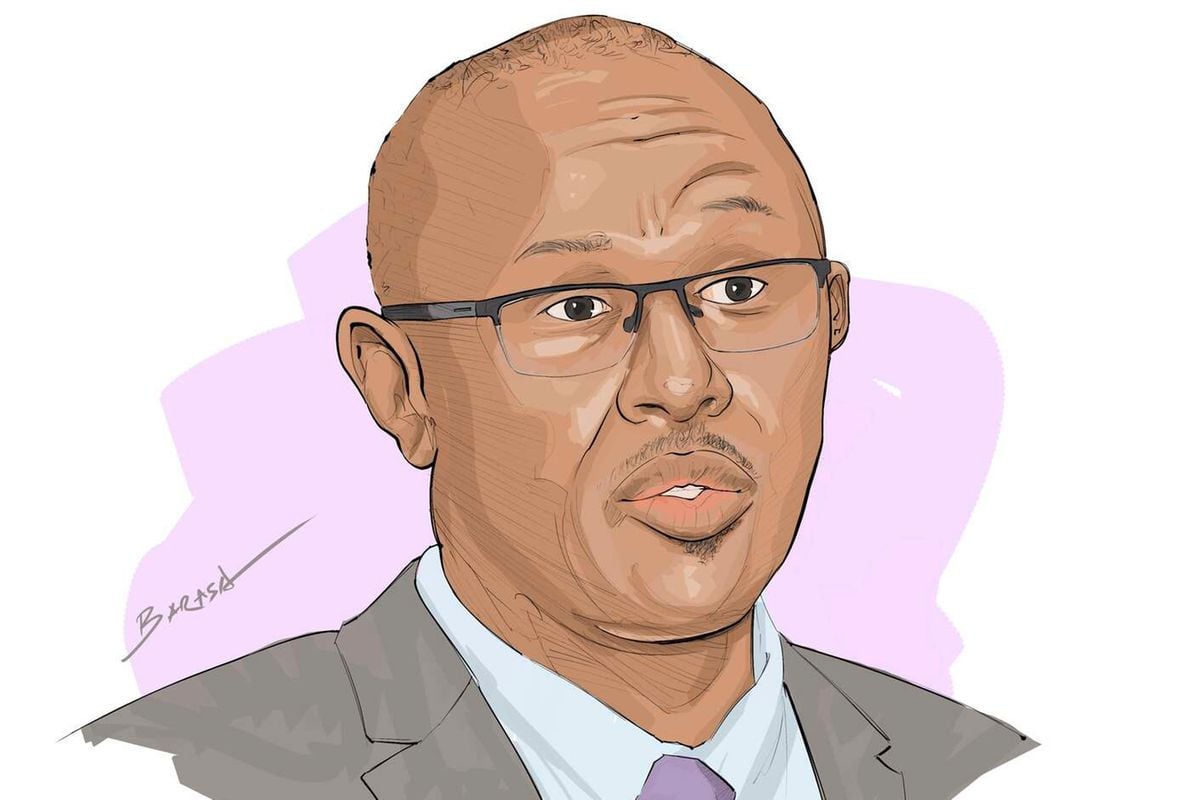Tanzania and UK: A royal partnership
The UK has long worked in partnership with Tanzania on health issues.Continue Reading
Tanzania Foreign Investment news
The UK has long worked in partnership with Tanzania on health issues.Continue Reading

By REUTERS
The mpox outbreak in Africa is still not under control, the Africa Centres for Disease Control and Prevention (Africa CDC) warned on Thursday, adding that cases were still increasing in several countries.
The World Health Organisation (WHO) declared the recent outbreak of the disease a public health emergency of international concern after the new variant was identified.
Countries in the continent are struggling to respond to another major outbreak coming at the heels of the Covid-19 pandemic that exposed weak health systems that were unprepared to deal with a major public health crisis.
Read: Gavi gives Africa 0.5m doses of newly approved Mpox vaccine
The number of mpox cases in Africa has surged 177 percent, and deaths have increased 38.5 percent compared with the same period a year ago, data from the Africa CDC showed.
“We can say today that mpox is not under control in Africa. We still have this increase of cases that is worrying for all of us,” Jean Kaseya, director general of Africa CDC, told a weekly briefing on the outbreak.
In one week, 2,912 new cases were reported compared with the previous week including a new country, Morocco, where a case was reported, confirming the spread of the disease in all four regions of the continent.
So far, 15 of the 55 member states of the African Union have reported cases, Africa CDC said.
“We still have people dying from mpox in Africa. In one week, we lost 14 people,” Kaseya added.
Read: Mpox vaccines: Where do they come from?
He added in some countries, such as Cameroon and the Democratic Republic of Congo, two strains of the disease were in circulation, but because surveillance and testing systems were not robust enough, it was impossible to tell if that was the case in other countries.
Kaseya said Rwanda had started its vaccination campaign, while the Democratic Republic of Congo, the epicentre of the outbreak, is set to start vaccinations in early October.

The Sacco Societies Regulatory Authority (Sasra) recently published its annual supervision report on operations of 357 deposit-taking and large non-withdrawable deposit-taking saccos.
Sasra chief executive Peter Njuguna spoke to the Business Daily on the state of the industry, including steps being taken to address sticky pain points such as loss of deposits, governance lapses, non-remittances and continued lack of insurance for deposits.
A loan to deposit (LTD) ratio exceeding 100 percent in the Sacco industry is inherent in the Kenya Sacco business model where most members save to improve their borrowing ability while also earning a return on the deposits. Hence, it is not a new phenomenon.
This is the reason the authority has proposed policy and legal amendments to effect the deposit guarantee fund and facilitate shared services amongst saccos to enhance savings mobilisation capabilities with safety as a central proposition.
Secondly, while deposits form the bulk of loan collateral, saccos have increasingly expanded collateral choices including registrable properties such as motor vehicles, land and buildings.
Thirdly, in lending, high consideration is placed on repayment ability hence the reason that non-performing loans ratio (NPLs) has remained below 10 percent in spite of the difficult economic situation.
Fourthly, loan contracts are member-centric hence LTD ratio would not be an appropriate indicator for quality of loan security in a financial institution.
Finally, the capital reserves form part of the loanable funds depending on the asset structure and policies of a Sacco and this explains why the external borrowing as a source of funding loans has remained at about three percent on average. Therefore, when deposits and reserves are put together it exceeds the loan at over 112 percent ratio.
Dormant members as a proportion of total members hit a peak of 25 percent during [the first year of Covid-19 in 2020 and it has averaged 20 percent since then, reaching 21 percent in 2023.
This in our view is due to the nature of the economic situation where Sacco members are unable to sustain monthly or regular savings with the Sacco due to diminished household incomes and sustained high cost of living.
This is evident from the sustained high proportion of loans to members for education and consumption financing over the last three years. These are social sectors that in practice should be funded from household earnings and not borrowed funds.
The traditional Sacco business model is that the value proposition is partly based on borrowing as a multiple of non-withdrawable deposits and the return on deposits in the Sacco.
This has the unintended consequences of permanently having an LTD ratio greater than 100 percent as saccos have increased loan amounts to multiple of five to retain members as the liquidity rises.
In itself, this is good from a financial intermediation viewpoint since it addresses the challenge of access to credit to households and micro-small and medium sized enterprises in the economy. But it is a concern from a financial stability viewpoint.
Saccos have invested heavily in payment solutions to make it convenient and efficient in cashing in and out; and thus enhancing deposit mobilising capabilities.
On the policy front, we have made proposals to address the safety concerns through operationalisation of the deposit guarantee fund and a structured management of liquidity in the Sacco industry akin to what happens in other deposit taking institutions world-wide.
SASRA mandate places good governance of saccos at the centre of its work. This is the reason that Sasra, beyond its administrative role, has powers to remove officers from office; and has collaborated with other agencies like Directorate of Criminal Investigations to take up suspected criminal offenses for investigation and prosecution.
This is important in affirming that there are consequences for bad governance in saccos. In addition, Sasra has continued to issue guidelines on good governance practices and has put before Parliament amendments to strengthen the criteria for determining the suitability of officers in Saccos.
Moreover, saccos employ a unique business and ownership model, where members are indeed the owners of the saccos and equally the customers who trade with their entity.
Their role in entrenching good governance should therefore be strengthened through appropriate education initiatives and active participation in the governance processes, which Sasra is facilitating, together with other national cooperative organisations.
DGF is a major pillar in enhancing financial stability of the Sacco industry and the proposed amendments to the Sacco Societies Act to enable its operationalisation are under consideration in the office of the Cabinet secretary.
This is a priority policy agenda of the government, and we expect that it will be concluded in this fiscal year.
The non-remittance challenge has persisted to the detriment of the affected saccos. While Cooperative Societies Act (Section 35) provides a legal mechanism on non-remittances; it is certainly not adequate.
Sasra is encouraging saccos to look at this as a business strategy where members remit directly through the front office services activity (Fosa), or direct debit as opposed to having the employer act as a collecting agent.
This calls for saccos to invest in appropriate capacity in payments processing and member education as non-remittance is becoming an existential threat to some saccos.
President Samia Suluhu Hassan has issued key directives to the police force aimed at strengthening public safety and addressing the growing crime rates in Tanzania.
To combat the growing threat of financial fraud, particularly online scams, President Samia pointed to the increase in digital transactions as a key driver for new criminal methods.
She revealed that in 2023 alone, over 5bn/- was lost to fraud, with the police recovering only 288m/-.
President Samia urged the police force to develop a comprehensive strategy to tackle cyber fraud as the government shifts towards a cashless economy.
“It is essential for the police to have a strategy to combat online fraud and we must collaborate with the relevant ministries to equip our police force with the tools needed to address this issue,” she said.
President Samia also urged the police to enhance road safety measures, following alarming statistics from the National Bureau of Statistics (NBS) that show a rise in road fatalities between 2022 and 2023.
According to the NBS, road accidents increased slightly from 1,720 in 2022, which claimed 1,545 lives, to 1,733 in 2023, resulting in 1,645 deaths. This brings the total number of fatalities over the past two years to 3,190.
“The rise in road accidents is largely attributed to human error, poor vehicle conditions and inadequate infrastructure. These issues must be addressed urgently,” President Samia said.
She noted that 37.9 per cent of last year’s accidents were caused by drivers’ negligence, 21.2 per cent by speeding and 13 per cent by careless motorcycle riders–all factors within the police’s control to rectify.
The president also said there is a need for the police to shift their focus on criminal investigations and control mechanisms and adapt to technological advancements.
She cited the NBS report on cybercrime, which saw a 36.1 per cent increase from 1,006 cases in 2022 to 1,369 by December 2023. Crimes such as spreading false information, distributing pornography images and online harassment were on the rise.
“With the growing influence of Artificial Intelligence (AI) and digital platforms, the police must be well-prepared to tackle crimes related to misinformation, especially as we approach local and general elections,” President Samia said.
She highlighted the potential rise in politically motivated cybercrime, including defamation, hate speech and false allegations.

Get the latest in African news delivered straight to your inbox
“We are not advocating for the shutdown of social media or silencing citizens’ opinions. However, we cannot turn a blind eye to crimes committed online. Crime is crime, whether it happens online or offline and the same legal measures should be applied,” she added.
As Tanzania gears up for the upcoming local government and general elections, President Samia stressed the importance of maintaining national unity and security throughout the election periods. She urged the police to remain vigilant before, during and after the elections to ensure peace and stability.
In her directives to the Ministry of Home Affairs and the police, the president called for the continued implementation of recommendations to strengthen the criminal justice system, particularly those that do not require legislative changes or significant budget increases.
ALSO READ: ‘4Rs not excuse for indiscipline’
She further urged the police to utilise Information and Communication Technology (ICT) to improve efficiency and crime control.
Among the initiatives she highlighted were the “safer city” projects, mandatory vehicle inspections to reduce road accidents and highway patrols. She stressed the importance of building the capacity of officers to implement these projects effectively.
Minister for Home Affairs, Hamad Masauni, expressed satisfaction with the police force’s progress, noting that many of the directives given by President Samia in the previous year’s meeting had been successfully implemented.
Source: allafrica.com
President Samia Suluhu Hassan has firmly defended Tanzania’s sovereignty, emphasising that the country is guided by its constitution, laws and traditions.
The Head of State was responding to concerns by a section of foreign envoys regarding the recent abduction and killing of Ali Kibao, a member of the opposition Chadema party.
In a bold statement, President Samia did not mince words as she reminded members of the international community, including diplomatic envoys in Tanzania, that the nation is fully capable of managing its internal affairs without external interference.
“We are not here to be instructed on what to do in our country. Tanzania has its constitution, laws and traditions that guide us,” President Samia asserted as she addressed the Senior Police Officers’ General Meeting held alongside the 60th anniversary of the force in Kilimanjaro Region.
The President’s remarks follow a series of tragic incidents that have shaken the nation, including the high-profile murder of a political figure and ongoing killings linked to superstition, witchcraft and political or economic interests.
In her address, President Samia assured the nation that the government had initiated thorough investigations into the killings, underscoring that such actions are in line with international norms.
She referenced similar incidents in developed countries, pointing out that the response of any responsible government, including Tanzania’s, is to deploy security agencies to conduct investigations.
“When we hear of a politician in a developed country surviving two assassination attempts, what does their government do? They immediately launch investigations. This is no different here in Tanzania,” the President said, emphasising that her administration will leave no stone unturned in uncovering the truth behind these tragic events.
Stressing the importance of human life, President Samia delivered a powerful reminder to the nation: life is irreplaceable and the protection of Tanzanian lives is a fundamental right enshrined in the Constitution.
“The life of every Tanzanian is protected by Article 14 of our Constitution, which clearly states that every person has the right to life and to be protected by the law,” she emphasised.
She appealed to all public officials, particularly those in leadership roles, to remain fully committed to their constitutional oaths.
“Those who serve in leadership positions must remember their oath to protect the people and uphold the rule of law. Our responsibility is to safeguard the lives and rights of all Tanzanians.”
President Samia also responded to recent diplomatic statements from international envoys expressing concern over the killing of political leaders.
While she acknowledged their expressions of sympathy, she firmly reminded them of Tanzania’s independence and sovereignty.
“Let me remind those expressing their concerns that Tanzania, as a sovereign nation, knows how to manage its own affairs. We have never directed our ambassadors abroad to interfere in their countries’ internal matters when similar incidents occur,” she said.
Referring to the Vienna Convention on Diplomatic Relations of 1961, President Samia urged diplomats to respect established protocols and refrain from overstepping their boundaries.
“Diplomatic relations must be conducted with respect and in accordance with international conventions. We appreciate compassion, but Tanzania will always act according to its own constitution and laws.”
In a call for unity and collective responsibility, President Samia highlighted the government’s unwavering commitment to ensuring peace and security for all Tanzanians.

Get the latest in African news delivered straight to your inbox
ALSO READ: Samia calls for unified action against crimes
As Commander-in-Chief of the Armed Forces, she assured the public that all necessary measures are being taken to prevent further loss of life and bring the perpetrators of violence to justice.
“Our constitution commands us to protect the lives of our citizens and we are bound by that oath. No one feels the pain of these killings more than us and we will not rest until justice is served,” she said.
As the country navigates this period of uncertainty and grief, President Samia called upon Tanzanians to stand together.
She urged leaders across all sectors, including political, religious and civil society, to exercise their influence responsibly and contribute to the promotion of peace.
“It is our collective responsibility to ensure that Tanzania remains a place where every citizen feels safe. To achieve that, we must all be accountable to the positions we hold and the duties we have sworn to uphold,” the President concluded.
Source: allafrica.com
AS Tanzania prepares for the upcoming local government elections on November 27, activists and stakeholders are calling for more civic education, particularly targeting marginalised groups such as youth, women and people with disabilities.
They argue that it is critical for these groups to fully understand the importance of participating in the electoral process to foster inclusivity and ensure that their voices are heard in political decision-making.
The local government elections will serve as a precursor to the country’s general election in 2025.
In an interview with Daily News, General Secretary for Vijana Connect Tanzania, Mr Soba Sanganya, stressed the need for increased educational efforts aimed at encouraging youth participation in political processes.
He pointed out that harbour negative perceptions about democratic processes, leading to low voter turnout and minimal engagement in political affairs.
“Youth participation in political matters remains alarmingly low, not because of a lack of awareness campaigns, but due to negative attitudes and perceptions about politics.
Many young people see politics as a waste of time, which significantly affects their engagement. This is why civic education, specifically targeting youth, is crucial,” Mr Sanganya said.
Mr Sanganya underscored the importance of enlightening young people about the significance of their votes and how their involvement in choosing leaders could directly impact their future and the development of their communities.
On the issue of women’s participation, Ms Victoria Melami, Managing Director of Timiza Ndoto Initiative, a non-profit organisation dedicated to empowering women and girls in leadership, technology and economic development, noted that progress has been made in encouraging women to participate in politics.
“To some extent, we are seeing more women becoming motivated to participate in politics. Women are now more empowered to engage in elections, both as voters and candidates,” Ms Melami explained.
“Despite ongoing efforts, the biggest challenges remain a lack of education and entrenched societal attitudes that discourage women from getting involved in politics.
Additionally, the lack of financial resources for campaigns continues to be a major obstacle for women aspiring to run for leadership positions,” she said.

Get the latest in African news delivered straight to your inbox
ALSO READ: INEC calls for proper handling of PVR kits
Ms Aneth Diarana, a representative from FUWAVITA, an organisation that supports women with disabilities through leadership and economic empowerment programmes, called for intensified efforts to raise awareness of electoral rights for people with disabilities.
She emphasised that many people with disabilities lack the necessary education and support to fully understand their rights and how to participate in elections and political processes.
However, Ms Diarana highlighted the need for the government to invest in improving voting infrastructure and services to make polling stations more accessible for people with disabilities.
“The government and election stakeholders must ensure that polling stations are equipped with the necessary support services and infrastructure to accommodate people with disabilities,” she said.
Ms Mary Kiria, a youth representative from the Ladies of Value NGO, called on political parties to provide more opportunities for youth and women who are interested in participating in elections and political leadership.
She criticised political parties for primarily using young people and women for campaigns, without giving them a genuine chance to compete for leadership positions.
Meanwhile, the Independent National Electoral Commission (INEC) continues its efforts to register voters and update information in the Permanent Voters’ Register (PVR) ahead of the elections.
The Commission is also working in collaboration with civil society organisations to provide voter education as part of an ongoing campaign to encourage citizens to exercise their constitutional right to vote.
Source: allafrica.com

Armenia: President of the Inter-Parliamentary Union (IPU) and Speaker of the National Assembly of Tanzania, Dr. Tulia Ackson, has underscored the pressing challenges facing youth worldwide, particularly inadequate education and high unemployment.
According to Dr. Tulia, these challenges have caused many young people to lose hope, driving some into criminal activities, public protests, and, in certain cases, migration in search of better opportunities.
Speaking at the official opening of the 10th IPU Global Conference of Young Parliamentarians in Yerevan, Armenia on Thursday, Dr. Tulia emphasized that the needs of youth must not be overlooked in these turbulent times.
She urged leaders and parliamentarians to create an enabling environment by prioritizing access to quality education and meaningful employment for youth.
“In today’s world, the youth face significant hardships, and it is our responsibility as leaders to ensure they are not left behind. We must make it a priority to offer them the tools and opportunities they need to thrive,” Dr. Tulia stressed.
ALSO READ:IPU President Tulia meets Putin in Petersburg
The conference, attended by parliamentary leaders and young lawmakers from IPU member countries, was officially opened by Armenian Prime Minister Nikol Pashinyan.
The conference, which seeks to address education and employment crises affecting youth, aims to develop solutions that prevent lost generations and ensure access to education and job opportunities for all young people.
Over 150 young parliamentarians from 60 countries are participating in the event, which runs from September 12 to 14, under the theme “Preserving Education and Employment in All Circumstances.
Source: allafrica.com

My name is Travis and I am 35 years old. I am employed and earn a net salary of Sh103,000 per month. I have a family. My monthly budget is as follows: Rent and water Sh28,000, school fees per term for two children Sh45,000, transport Sh8,000, family activities and emergencies Sh10,000, harambees and support groups Sh5,000, miscellaneous expenses Sh8,000 (can sometimes go up to Sh12,000) and savings Sh7,000.
I started saving in June 2024. I do not have huge loans that I am repaying except for short-term loans of Sh80,000 that I am repaying in the next four months. It has been difficult to save enough money to start a major project. I want to buy a car soon as my family grows and maybe a piece of land in the next five years. Help me to achieve these two goals.
The first thing you need to do is to define your goals more clearly so that you can make your savings more targeted.
For your goal of owning a car, determine the price range. Let’s say you want a second-hand car worth about Sh600,000.
As for the land, you need to decide what you want to do with it. Is it for speculation, to build a house or to generate rental income? This will help you identify the right location and budget.
For planning purposes, we will assume that you intend to purchase the land to build your home. We will use an estimate of Sh900,000 for the land price.
Next, we will evaluate how you can save and invest to achieve these goals. From the information you have provided, your total monthly expenses come to Sh74,000 and you are currently saving Sh7,000, leaving you with Sh22,000.
This surplus is likely being used to pay off your loans, which will clear in four months. Now, to meet your goals within your set timelines, I suggest increasing your current savings to Sh10,000 even as you continue to pay off the loan.
You can do this by reducing Sh1,000 each from your contributions to harambees, family activities expense and the miscellaneous allowance.
Once you have increased your savings to Sh10,000, I recommend that you place these funds in a Sacco. Identify and save with one that offers development loans. This will help you build up shares so that when the time comes, you can borrow funds to build your house. To maintain consistency in your saving, I would advise you to set up an automated deduction of this contribution at source.
After paying off your current loans, invest the Sh22,000 you will have freed up in a money market fund (MMF). Research different fund managers and identify an ideal one with a track record of good returns.
To maintain discipline, consider setting up a bank standing order for the investment. If you invest in the MMF for two years at the current net annual interest rate of about 13 percent, your total investment should grow to approximately Sh600,000. This would enable you to buy the car.
To purchase the land within your target of five years, continue investing the Sh22,000 monthly in the MMF for a further three years. By then, your fund should grow to around Sh950,000, allowing you to buy the land as planned.
Assuming that you have been contributing Sh10,000 per month to your Sacco within this period and that you reinvest the dividends earned (approximating 10 percent per year), your shares could be worth around Sh780,000.
At this point, you can apply for a development loan of Sh2,000,000 from your Sacco to build your house.
If you get the loan at an interest rate of 12 percent and a repayment period of eight years, your monthly repayments would be Sh32,506.
To manage this, you can redirect the Sh22,000 you have been investing in the MMF and the Sh10,000 going into the Sacco towards this loan repayment.
Once you have built your house and moved in, you will be saving on rent and you can use this freed-up money of about Sh28,000 to invest towards fulfilling other goals such as saving for your children’s higher education and building a passive income for your retirement.
If you have any money problems, send us an email at [email protected] and leave your number for contact. Money questions will be answered on this column.
DAR ES SALAAM — MUHIMBILI National Hospital (MNH) has achieved a significant milestone in Tanzania’s healthcare sector by introducing In Vitro Fertilisation (IVF) services, becoming the first public hospital to offer these treatments.
This groundbreaking development offers much-needed relief to couples facing infertility challenges who were previously unable to access IVF treatment in public hospitals in Tanzania.
Research conducted by MNH reveals that infertility affects 30 per cent of those undergoing screening, with 65 per cent of affected individuals being women and 35 per cent being men.
This means that three to four out of every ten patients are diagnosed with infertility.
Speaking yesterday during the inauguration of the facility dubbed “Samia Suluhu Hassan IVF Centre,” Vice-President Dr Philip Mpango said that the event marked a significant milestone in supporting citizens who have long faced fertility challenges, including those who have given birth to children with hearing impairments.
The launch also coincided with the reception of a Mobile Clinic Van donated by Aster Foundation, along with the switching on of hearing aids (Cochlear Implants) to 15 children born with hearing impairments.
“It is a great relief to see IVF services being offered for the first time in public hospital, these services were only available in private hospitals, where costs were prohibitively high.
I assure you, here, it will be genuinely affordable,” said Dr Mpango.
He mentioned that although private hospitals in cities like Arusha and Dar es Salaam had begun offering the services, many citizens were still forced to seek treatment abroad in countries such as Turkey, South Africa and Kenya.
Dr Mpango explained that the project, which began in 2019, has been implemented to high standards, costing 1.2bn/-, with everything funded by MNH’s internal revenue.
He commended the Ministry of Health and the MNH Board of Trustees and management for successfully executing the IVF project in public hospital.
Dr Mpango said, “this initiative at the national hospital is a fulfilment of the government’s commitment to reduce the number of patients seeking treatment abroad due to a shortage of specialised professionals or lack of necessary medical equipment.”
Regarding hearing difficulties, he said that before 2017 Cochlear Implant services were unavailable in the country, forcing those in need of the services to seek them abroad.
The availability of these services is expected to boost medical tourism in Tanzania.
Furthermore, he commended the increased accessibility of healthcare services, including the establishment of mobile clinics and thanked the Aster Foundation for their support, having already provided two vehicles one for Zanzibar and another for the Mainland, which was handed over yesterday.
Dr Mpango urged the Ministry of Health, in collaboration with the Ministry of Finance, to explore ways to reduce the costs of IVF services at the centre, possibly through tax exemptions.
For her part, Minister for Health Ms Jenister Mhagama commended MNH for fully implementing the IVF project, stating that despite the high costs of healthcare services, the government is committed to provide sustainable solutions, including the introduction of a health insurance scheme covering both basic and specialised services.

Get the latest in African news delivered straight to your inbox
She affirmed that the government will continue to oversee the provision of healthcare services, ensuring that systems are integrated across all hospitals along with health insurance to alleviate the burden on citizens.
MNH Executive Director Prof Mohammed Janabi said that in every ten patients at the women’s clinic, three to four have fertility issues, with infertility affecting approximately 17 per cent of the population globally.
Prof Janabi added that the centre is equipped with facilities capable of preserving women’s eggs for up to 30 years, along with a system for testing male sperm and genetic material.
He further mentioned that the centre is already staffed with ten specialists and ten women are ready to begin treatment following the launch, with plans underway to invite more experts from abroad for collaboration.
Source: allafrica.com
MBEYA: THE High Court of Tanzania, Mbeya Registry, has rejected the appeal filed by Mashaka Msangawale, seeking to overturn his conviction for rape.
The judgment that was delivered on Tuesday by Justice Musa Pomo, upheld the 30-year prison sentence initially handed down by the Chunya District Court.
Msangawale was convicted in 2021 for rape of a 15-year-old girl, with the crime occurring on December 1, 2021, in the Lyeselo village in the district.
He had challenged the conviction, arguing that the prosecution failed to meet the legal requirements to prove the elements of rape.
Convicted under sections 130(1)(2)(e) and 131(1) of the Penal Code [Cap 16 R.E. 2022], Msangawale argued that the evidence presented was insufficient.
However, Justice Pomo, in his judgment, stated, “Having considered the evidence from both sides, the court finds no reason to believe that the offence was not proven by the respondent.”
During the trial, the prosecution presented three key witnesses: the victim, her mother and Obeid Kasaba Prosper (PW3).
Evidence included the victim’s torn underpants (exhibit PE1) and a Police Form 3 (PF3) from a medical examination (exhibit PE2).
The High Court determined that the district court had not erred in its judgment and concluded that the prosecution had proven the case beyond reasonable doubt.
Justice Pomo noted that evidence from the victim, her mother and other evidence were adequate to uphold the conviction.

Get the latest in African news delivered straight to your inbox
According to court documents, the victim was a Form II student at Iyela Secondary School in Mbeya. On the day of the attack, Msangawale, who was working as a labourer for the victim’s family, lured her to a nearby tobacco drying shed, where he forcibly assaulted her, tearing her underpants in the process.
The victim’s mother arrived at the scene shortly after the attack. In the appeal, Ms Nyasige Kajanja, representing the defence, argued that penetration a crucial element of the rape charge was not sufficiently demonstrated.
She contended that the victim did not clearly specify which part of her private area was penetrated and questioned the qualifications of the nurse who conducted the medical examination and completed the PF3 form.
State Attorney, Ms Veneranda Masai, countered these arguments, asserting that the victim’s detailed testimony was sufficient to establish penetration.
She emphasised that in sexual offence cases, especially involving minors, the victim’s account is often the most compelling evidence.
Ms Masai also acknowledged that while the nurse’s qualifications might not have been fully established, the testimony of the victim and her mother alone was adequate to support the conviction.
Justice Pomo found no merit in the appellant’s arguments and confirmed the original conviction, thereby maintaining the 30- year sentence.
Source: allafrica.com
Zanzibar Investment News Tanzania Investors Ltd © 2025